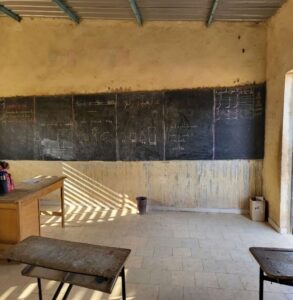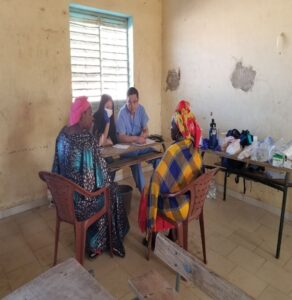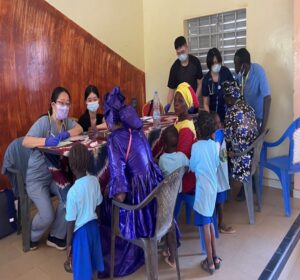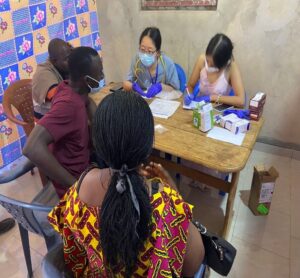I consider myself a “good person.” Who doesn’t?
I’m kind, I study hard, and I walk the dog. I even put money in my church’s offering basket.
I lived in such complacency for my entire life. While I wasn’t necessarily wrong about being “good,” my lifestyle became passive and my worldview fundamentally one-dimensional. I studied for tests and took notes for the next. I finished my to-do lists to begin another. I interacted with the same people yesterday, today, and tomorrow. Sure, I was polite to everyone, but why know them past their superficial facades? Why explore a topic that isn’t relevant to school? Why complicate my busy life with issues that aren’t mine? Subconsciously, I believed everything I experienced, knew, and owned was all that ever was, and ever will be, until, by chance, outside forces changed them. My world consisted solely of my pertinent realities. For sixteen years, I comfortably surrounded myself with like-minded people from similar cultures.
One of the chance occurrences that altered my small world ended up transforming my static mindset and life as well. Through non-profit Africa Cries Out, a group of Chinese-American physicians who travels annually to Senegal, Africa to provide healthcare to those who otherwise have none. Taking an interest in the mission, my physician mother invited me to accompany and be her assistant last March.
Next thing I knew, I was carrying a luggage full of medicine aboard a plane destined four thousand miles away.

Medicines that were donated to Africa Cries Out that we brought from the USA to Senegal.


A classroom in Dakar, Senegal was used as a consultation area during the medical mission last March.
No amount of writing could adequately tell my story of the sandy, wastelands of Senegal. Every day, I felt great sympathy, fear, gratitude, and grief from the living conditions I previously saw only in pictures. Old cars crowded streets lined with destitute homes. Clean water, plumbing, and sanitation were luxuries. Safety was never guaranteed. With heartbreak, I compared the perception of healthcare in Senegal to cosmetic surgery in America: time-consuming, frivolous, and for the rich. Despite battling STDs, worms, and even cancer, the patients we treated showed great gratitude and kindness.


Patients calmly wait for their turn to be attended to by the volunteer doctors and medical team.


Patients being seen by the volunteer doctors and other members of the medical team.
Honestly, I did not expect how people with such a distinctive culture would behave, but I was amazed at how they neither ridiculed us for our differences nor idolized us for flattery; they simply treated us as neighbors. Amidst their appalling poverty – children playing in filthy roads, spigots leaking muddy water, penniless vendors haggling noisily on every street corner – they lifted our spirits and inspired in us perseverance, sharing their culture through music, tourism, food, and dance. They graciously accepted our services and donations, offering companionship in return.
I will never forget the day we visited a small Christian church in the busy city of Dakar, the capital. A few children were playing in the narrow street outside the church. I approached them and asked if my friends and I could join in. They were thrilled and began a game of soccer. None of us were very good at it, but we had so much fun. I bought out my instant camera and showed the children how it could print a small picture. They were immediately captivated and asked to take many photos with us. I realized this was probably the first time they had ever had a picture taken of them, much less kept the photo. Fascinated, they huddled around small photos of their bright, smiling faces and talked excitedly, thanking me and asking for more. Of course, I agreed, and we posed many more times for the camera. Then, my friends and I went inside the church, since the service was beginning soon. Instead of leaving us as I thought they would, these children gathered around the church and watched us worship and give thanks to God. They thanked us many times for the pictures and held them tightly. My heart was heavy to say goodbye. These precious children were a beautiful projection of the hearts of the patients we later treated. As much as we impacted their lives, they changed mine. How trivial my personal concerns were in such a place as this, I thought. What a wonder it is that these people live on the same earth as me and my problems.

Playing with street children in Dakar, Senegal.

Street children hanging around us during Gospel service.

Street children posing and taking pictures with us.

A photo that we gave out to the fascinated street children who took pictures with us.

A view of beautiful Dakar, as beautiful as its people.
In my ten days in Senegal, I finally realized the extent of the world was by no means limited to the bubble of complacency I created for myself, which subconsciously diminished my scope of compassion. With shame, I remembered how often my issues took priority over my pity for the disenfranchised, as they didn’t affect my personal life. Walking through the slums of Senegal with the most impoverished people transformed my pity into respect and empathy. Unfamiliar with security and luxury, the people I met truly understood the value of service and generosity. There, I discovered a significant purpose in devoting my life to such service and became passionate about someday working as a physician in developing countries where quality healthcare and medical equipment are scarce. The strength, gratitude, and hospitality I experienced inspired me to look beyond my comfortable life of personal priorities and familiarity to enhance my global perspectives. I learned that there’s more to life than being busy. There are global issues to address, worldviews to explore, things to learn, and people to serve. Senegal, particularly this Africa Cries Out ministry, has definitely changed my life. It made me think more of others instead of thinking only about myself. It made me want to do good not only to benefit myself, but to benefit other people as well.
